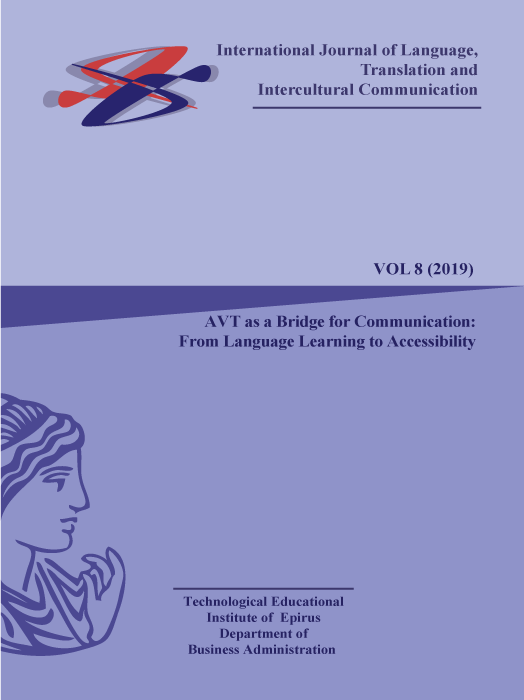The Small Words of Film Spoken Language for Second Language Learning

Published:
Apr 15, 2019
Keywords:
spoken language in films discourse markers in spoken language film discourse natural language ESL classes
Abstract
Although being scripted, film dialogues are claimed to mirror natural spoken language. Exposing second language (L2) learners to instances of authentic language is reported to be stimulating and enjoyable. Amongst others, natural spoken discourse is hallmarked by discourse markers, which are small words, or prefabricated units, which constitute the bulk of native-like conversation. Helping students become acquainted with the small words of natural language can increase their perceived proficiency. In light of these argumentations, this paper is aimed at presenting a trial lesson with sixteen young adults who participated in a 2-hour class. During the class, they became acquainted with discourse markers, which were sourced from film dialogues. Students had firstly to infer their meanings and propose coherent translation candidates by recurring to their interlanguage. Then, they were prompted to search for translations in online language platforms. The paper findings highlight that the trial lesson was not only enjoyable and stimulating, but students felt that their L2 knowledge increased. Furthermore, they were stimulated by the inferring tasks and appreciated the word search. In some instances, students' inferences outperformed dictionary results and online suggestions.
Article Details
- How to Cite
-
GIAMPIERI, P. (2019). The Small Words of Film Spoken Language for Second Language Learning. International Journal of Language, Translation and Intercultural Communication, 8, 110–127. https://doi.org/10.12681/ijltic.20280
- Section
- Articles

This work is licensed under a Creative Commons Attribution-NonCommercial-ShareAlike 4.0 International License.
Copyright Notice
Authors who publish with this journal agree to the following terms:
- Authors retain copyright and grant the journal right of first publication with the work simultaneously licensed under a Creative Commons Attribution License that allows others to share the work with an acknowledgement of the work's authorship and initial publication in this journal.
- Authors are able to enter into separate, additional contractual arrangements for the non-exclusive distribution of the journal's published version of the work (e.g., post it to an institutional repository or publish it in a book), with an acknowledgement of its initial publication in this journal.
- Authors are permitted and encouraged to post their work online (e.g., in institutional repositories or on their website) prior to and during the submission process, as it can lead to productive exchanges, as well as earlier and greater citation of published work (See The Effect of Open Access).
Downloads
Download data is not yet available.
References
Giampieri, P. 2018. 'Spoken Language Features (and Anomalies) in Films for ESL classes'. Language Learning in Higher Education, CercleS 8 (2): 399-425.
Giampieri, P. Forthcoming. 'Assessing Discourse Markers in Dictionaries for Italian Learners of English as L2'. The Linguistics Journal.
Biber, D. and Conrad S. (1999). 'Lexical bundles in conversation and academic prose', in Hasselgard, H. and Oksefjell, S., (eds.), Out of Corpora: Studies in Honour of Stig. Johansson, pp. 181-189. Amsterdam: Rodopi.
Boers, F., Eyckmans, J., Kappel, J., Stengers, H. and Demecheleer, M. (2006). 'Formulaic sequences and perceived oral proficiency: Putting a Lexical Approach to the test'. Language Teaching Research 10 (3): 245–261.
Caines, A., McCarthy, M. and O' Keeffe, A. (2016). 'Spoken language corpora and pedagogy', in Farr, F. and Murray, L., (eds.), The Routledge Handbook of Language Learning and Technology, pp. 348-361. London: Routledge, Taylor and Francis Group.
Carter, R. and McCarthy, M. (2006). Cambridge Grammar of English: A Comprehensive Guide to Spoken and Written English Grammar and Usage. Cambridge: Cambridge University Press.
Carter, R. and McCarthy, M. (2015).' Spoken Grammar: Where Are We and Where Are We Going?', Applied Linguistics 1: 1-21. Oxford: Oxford University Press.
Donaghy, K. (2014). How can film help you teach or learn English? https://www.britishcouncil.org/voices-magazine/how-can-film-help-you-teach-or-learn-english. (Accessed September 2018)
Erman, B. (2001). 'Pragmatic markers revisited with a focus on you know in adult and adolescent talk', Journal of Pragmatics 33: 1337-1359.
Gilmore, A. (2007). 'Authentic materials and authenticity in foreign language teaching'. Language Teaching, 40: 97-118.
Gilmore, A. (2010). 'Exploiting film discourse in the foreign language classroom', in Mishan, F. and Chambers A., (eds.), Perspectives on Language Learning Materials Development, pp. 110-148. Oxford: Peter Lang AG.
Guariento, W. and Morley, J. Leech, G., Rayson, P. and Wilson, A. (2001). Word Frequencies in Written and Spoken English:
Based on the British National Corpus. London: Longman.
McCarthy, M. (2010). 'Spoken fluency revisited'. English Profile Journal, 1: 1-15.
McCarthy, M. and Carter, R. (2001). 'Ten criteria for a spoken grammar', in Hinkel, E. and Fotos, S. (eds.), New Perspectives on Grammar Teaching in Second Language Classrooms, pp. 51-75. Mahwah, NJ: Lawrence Erlbaum Associates.
McGrath, I. (2013). Teaching Materials and the Roles of EFL/ESL Teachers. Bloomsbury.
Nunan, D. (1998). 'Teaching grammar in context'. ELT Journal 52 (2): 101-109.
O'Keeffe, A., McCarthy, M. and Carter, R. (2007). From Corpus to Classroom: Language Use and Language Teaching. Cambridge: Cambridge University Press.
Sherman, J. (2003). Using Authentic Video in the Language Classroom. Cambridge: Cambridge University Press.
Tomlinson, B. (2012). 'Materials development for language learning and teaching'. Lang. Teach. 45 (2): 143–179
Online Resources
Common European Framework of Reference for Languages: https://www.coe.int
Cambridge online dictionary : https://dictionary.cambridge.org
Collins online dictionary : https://www.collinsdictionary.com/it/
Linguee: https://www.linguee.it
Reverso : http://www.reverso.net
Subzin film quotes platform: http://www.subzin.com/
Wordreference : https://www.wordreference.com/it/


